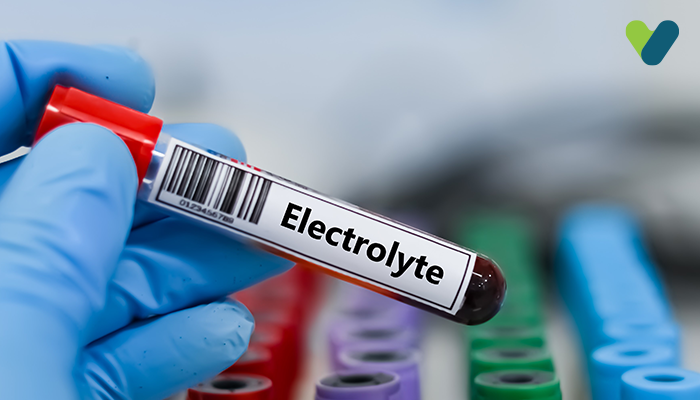An electrolyte test or serum electrolyte test is a blood test that indicates the levels of the body's prime electrolytes (sodium, potassium, chloride, and bicarbonate). This electrolytes blood test determines whether there is an imbalance of electrolytes in the body or not. The prime objective of this test is to monitor the efficacy of treatment for an imbalance that inhibits the functions of various organs of your body.
Test Summary
| Also known as | Electrolyte Test or Serum Electrolyte Test |
| Test Type | Blood |
| Blood gas test includes | Checks the main electrolytes of your body |
| Preparation | No prior preparation is needed |
| Reporting | Within 24 hrs |
| Test price | The price of this test may vary from city to city and lab to lab |
| Also included in | Health Insurance Plans |
| Related tests | Kidney function test, pinch test, electrocardiogram (ECG or EKG), blood test, anion gap |
The electrolyte imbalance test is primarily performed as part of your routine health check-ups to diagnose or evaluate the treatment of a fluid and electrolyte imbalance in the body. Assessing the ions in the electrolyte panel will help doctors to understand various health conditions such as high blood pressure (hypertension), heart failure, and liver and kidney disease.
Electrolyte Disorders
Electrolytes are elements and compounds (Calcium, chloride, magnesium, phosphate, potassium, and sodium) that are present in your body. These elements control some imperative physiologic functions. An electrolyte disorder happens when the levels of electrolytes in your body are either too high or too low. Electrolytes’ levels should be balanced in your body to function aptly. Else, all the vital systems of your body get affected.Symptoms of Electrolyte Disorder
The symptoms may not be the same for all electrolytes but they may share similar symptoms.Common symptoms are:
- Irregular heartbeat
- Faart rate
- Fatigust hee
- Tiredness or lethargy
- Convulsions or seizures
- Nausea
- Vomiting
- Diarrhea or constipation
- Abdominal cramping
- Muscle cramping
- Muscle weakness
- Irritability
- Confusion
- Headaches
- Numbness and tingling
Types of Electrolyte Disorders
Enhanced levels of an electrolyte are indicated with the prefix “hyper-.” Depleted levels of an electrolyte are indicated with “hypo-.”Conditions caused by electrolyte level imbalances include
- Calcium: Hypercalcemia and hypocalcemia
- Chloride: Hyperchloremia and hypochloremia
- Magnesium: Hypermagnesemia and hypomagnesemia
- Phosphate: Hyperphosphatemia and hypophosphatemia
- Potassium: Hyperkalemia and hypokalemia
- Sodium: Hypernatremia and hyponatremia
Treatment of Electrolyte Disorder
You may require treatment based on the types of electrolyte disorder you have and the underlying condition that’s causing it.Some general treatments are also there to reinstall the proper balance of minerals in the body. These treatments can be:
1. Intravenous (IV) Fluids
Sodium chloride solutions will rehydrate your body. This treatment is applied if there is any dehydration due to vomiting or diarrhea. Electrolyte supplements are usually inserted into IV fluids to rectify deficiencies.2. Certain IV Medications
Some IV medications will restore electrolyte balance quickly. They will also safeguard you from negative effects if you are treated for another health issue. Common medications that are used are calcium gluconate, magnesium chloride, and potassium chloride.3. Oral Medications and Supplements
Oral medications and supplements will also be effective in correcting abnormal mineral deficiencies in your body. This is administered if you are diagnosed with ongoing kidney disease.Depending on your electrolyte disorder, you may receive medications or supplements such as:
- Calcium (gluconate, carbonate, citrate, or lactate
- Magnesium oxide
- Potassium chloride
- Phosphate binders like sevelamer hydrochloride (Renagel), lanthanum (Fosrenol), and calcium-based treatments such as calcium carbonate
Once the imbalance is modified, your doctor will treat the underlying cause.
Electrolyte Panel Test Procedure
A health care expert or a lab technician usually collects a blood sample from a vein in your arm by inserting a small needle. A small amount of blood is deposited into a test tube or vial. You may feel a little sensation or pain when the needle takes out. This usually takes less than five minutes. You don't need to perform any special preparations for an electrolyte panel.Normal Electrolyte Levels
| Test | Normal range (adults 18-60 years old) | Normal range (adults over 60 years old) |
| CO2 (carbon dioxide or bicarbonate) | 23-29 mEq/L (milliequivalent units per liter of blood) | 23-31 mEq/L (adults 61-90 years old); 20-29 mEq/L (adults over 90 years old) |
| Ca+ (calcium) | 8.6-10.2 mg/dL | 8.6-10.2 mg/dL |
| Na+ (sodium) | 136-145 mEq/L | 132-146 mEq/L (adults over 90) |
| K+ (potassium) | 3.5-5.1 mEq/L | 3.5-5.1 mEq/L |
| Cl- (chloride) | 98-107 mEq/L | 98-111 mEq/L (adults over 90) |
If you don’t have normal electrolytes levels, this doesn’t indicate that you have a medical problem. Many factors may influence the test levels. If you have diarrhea or vomiting or you are taking medicines such as antacids and blood pressure medicines, then they may also cause abnormal results.


